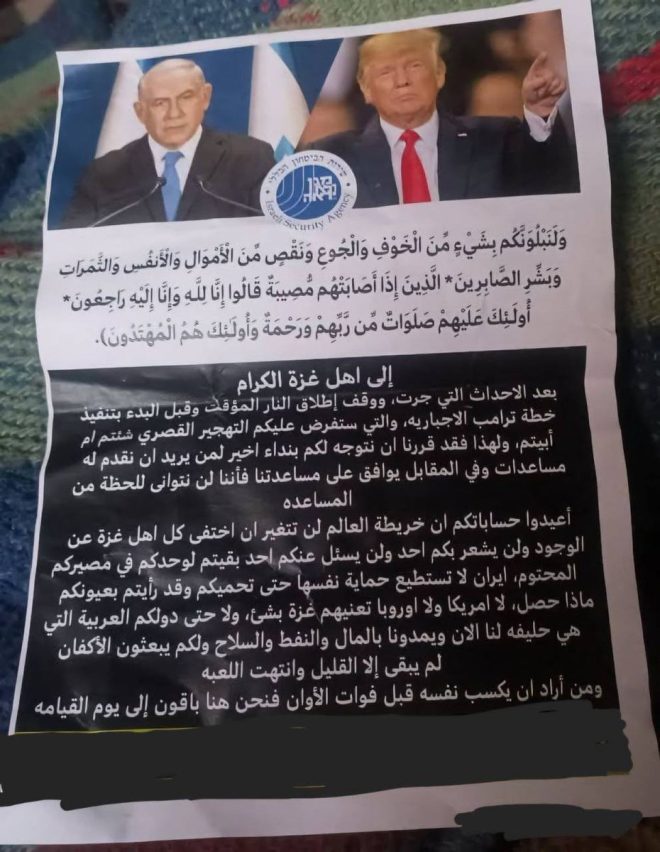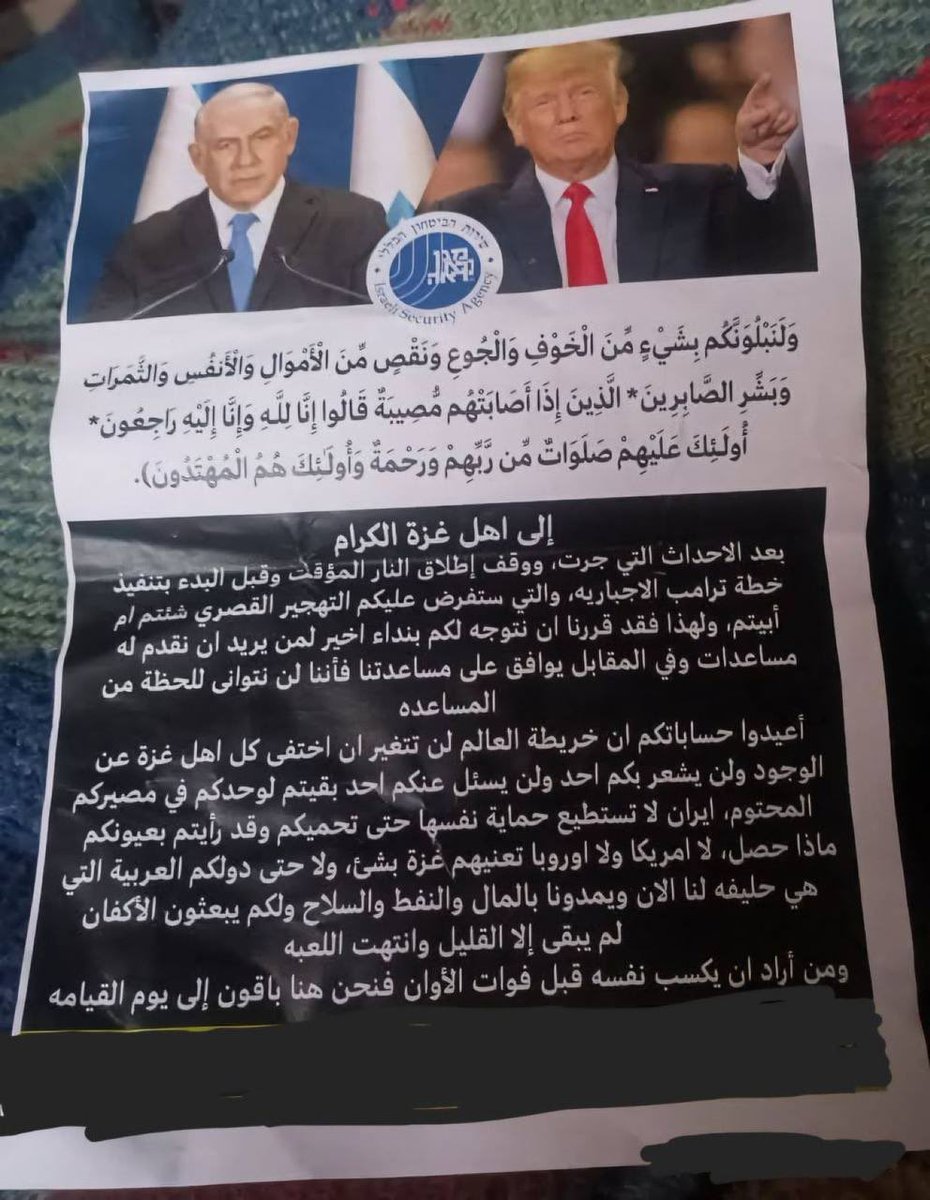
The Impact of Leaflets Dropped by Israeli Shin Bet Over Gaza Strip
In a recent development that has garnered significant attention, the Israeli security agency Shin Bet has begun dropping leaflets over residential areas in the Gaza Strip. This action is being interpreted as a form of psychological warfare, targeting the civilian population in a region already fraught with tension and conflict. The leaflets serve as a stark warning to the residents of Gaza, threatening violence and potential displacement in the wake of ongoing hostilities.
Understanding the Context
The situation in Gaza has been volatile, characterized by a complex interplay of historical grievances, territorial disputes, and ongoing military confrontations. The dropping of leaflets by Shin Bet is a continuation of tactics employed in asymmetric warfare, aimed at instilling fear and confusion among the civilian populace. The content of these leaflets, which was shared on social media, reflects a chilling message: it outlines consequences for the residents of Gaza following recent events, hinting at the possibility of widespread violence and forced displacement.
Psychological Warfare Tactics
The use of leaflets as a psychological tool is not new in military strategy. By disseminating threatening messages, military organizations aim to demoralize the enemy and manipulate public perception. In this case, the leaflets dropped by Shin Bet are designed to create an atmosphere of fear among Gaza’s residents, potentially prompting them to flee or comply with Israeli demands. This tactic raises ethical questions about the treatment of civilians in conflict zones and the responsibilities of state actors under international law.
The Message to the People of Gaza
The leaflets reportedly address the "Honorable People of Gaza," indicating an attempt to appeal to the identity and dignity of the residents, while simultaneously delivering a stern warning. The message conveys a sense of urgency and desperation, as it outlines the consequences of continued conflict. Such communications can lead to increased anxiety and panic among civilians, who may feel trapped in a precarious situation with limited options for safety or recourse.
- YOU MAY ALSO LIKE TO WATCH THIS TRENDING STORY ON YOUTUBE. Waverly Hills Hospital's Horror Story: The Most Haunted Room 502
The Role of Social Media
The dissemination of this information via social media platforms, such as Twitter, highlights the growing role of digital communication in modern conflicts. Images and messages can quickly spread, influencing public opinion and awareness both locally and globally. The tweet from Suppressed News not only reports on the leaflet drop but also contextualizes it within the broader narrative of conflict in the region. This use of social media serves to amplify the psychological impact of the leaflets, as images and accounts of the situation reach a wider audience, potentially galvanizing international attention and response.
Potential Consequences for Civilians
The implications of Shin Bet’s leaflet drop are profound for the civilian population of Gaza. Residents may find themselves caught in a cycle of fear and uncertainty, leading to increased displacement and humanitarian needs. The threat of violence can exacerbate existing vulnerabilities, as families grapple with the prospect of losing their homes and livelihoods. This situation underscores the urgent need for humanitarian assistance and protection for civilians in conflict zones, as well as the importance of dialogue and de-escalation in addressing the root causes of the conflict.
International Reactions and Humanitarian Concerns
The leaflet drop has sparked concerns among human rights organizations and international observers. Many view this tactic as a violation of the principles of distinction and proportionality outlined in international humanitarian law, which aims to protect civilians in armed conflict. The act of threatening civilian populations with violence raises serious ethical and legal questions about the conduct of state actors in warfare.
In response to such actions, international bodies may be called upon to intervene, advocating for the protection of civilians and the promotion of peace talks. The situation in Gaza requires a comprehensive approach that addresses the immediate humanitarian needs while also seeking long-term solutions to the underlying political and social issues.
Conclusion
The recent leaflet drop by the Israeli Shin Bet over the Gaza Strip marks a significant escalation in psychological warfare tactics employed in the ongoing conflict. The threats contained within the leaflets reflect broader tensions and the precarious situation facing civilians in Gaza. As the situation evolves, it is crucial for the international community to remain vigilant and responsive, advocating for the protection of human rights and the cessation of hostilities. The plight of the people of Gaza must not be forgotten amidst the complexities of geopolitical conflict, and efforts toward peaceful resolution and humanitarian assistance must remain a priority.
By understanding the implications of such actions and fostering dialogue, there is hope for a future where the needs and rights of civilians are prioritized, paving the way for lasting peace in the region.

JUST IN:
The Israeli Shin Bet dropped leaflets over residential neighborhoods in the Gaza Strip.
It’s psychological warfare and a threat to kill and displace all the residents of the Gaza Strip
“To the Honorable People of Gaza,
After the recent events, the temporary… pic.twitter.com/8ubHK7NBQy
— Suppressed News. (@SuppressedNws) February 20, 2025
JUST IN: The Israeli Shin Bet Drops Leaflets Over Gaza Strip
It’s hard to ignore the tension in the air when news breaks about the Israeli Shin Bet dropping leaflets over residential neighborhoods in the Gaza Strip. This act is more than just a simple distribution of paper; it’s a calculated move that carries profound implications for the people living there. These leaflets are not just innocuous messages; they represent a form of psychological warfare that can instill fear and uncertainty among residents.
Understanding the Context of Leaflet Distribution
To truly grasp the weight of this situation, one must consider the historical and ongoing conflict between Israel and Palestine. The Gaza Strip, a densely populated area, has been a focal point of tension for decades. The Israeli Shin Bet, Israel’s internal security service, often engages in various tactics to manage and control the narrative surrounding the conflict. Dropping leaflets can be seen as an attempt to influence public perception and behavior within the region.
The leaflets dropped by the Shin Bet reportedly contained threats aimed at the residents of Gaza, warning them about the potential consequences of their actions during these turbulent times. This tactic is meant to create a sense of urgency and fear, pushing people to reconsider their stance or actions in light of the threats made. It’s a stark reminder of how psychological operations can play a significant role in warfare, impacting not just the physical but also the mental well-being of civilians.
Psychological Warfare: A Tool of Control
When we talk about psychological warfare, we’re delving into a realm that many might not think about when considering military strategies. The leaflets serve as a tool to manipulate emotions and perceptions, aiming to control the thoughts and actions of the residents. By instilling fear, the Shin Bet hopes to weaken the resolve of the people in Gaza, making them more compliant to Israeli demands or actions.
The phrase “It’s psychological warfare and a threat to kill and displace all the residents of the Gaza Strip” resonates deeply. It highlights the extreme measures that can be taken in conflict situations, where the innocent often bear the brunt of military strategies. The idea of displacement is particularly poignant, as it echoes the traumatic experiences of many who have had to leave their homes due to violence and conflict.
Analyzing the Message: “To the Honorable People of Gaza”
The opening line of the leaflets, “To the Honorable People of Gaza,” is particularly striking. It attempts to establish a tone of respect, which contrasts sharply with the underlying threats being issued. This juxtaposition raises questions about the intentions behind such communication. Is it a genuine attempt to connect with the people, or merely a façade to mask the aggressive nature of the message?
Furthermore, the use of the term “honorable” suggests an appeal to the dignity of the residents, which can be seen as an attempt to manipulate their emotions. The Shin Bet seeks to position itself as an authority that acknowledges the humanity of the people it threatens, while simultaneously delivering a message that can lead to fear and anxiety.
The Impact on Civilians in Gaza
For the residents of Gaza, receiving such leaflets can be a harrowing experience. Imagine looking out your window and seeing a leaflet fluttering down, carrying with it a message that could dictate your fate. The psychological toll of such tactics cannot be understated. It’s not just about the immediate fear of violence; it’s about the long-term effects on mental health and community cohesion.
Families may find themselves living in a constant state of alert, unsure about what the future holds. Children, in particular, are vulnerable to the psychological impacts of such warfare, which can lead to anxiety, trauma, and a host of other mental health issues. The cycle of fear and uncertainty can perpetuate a state of crisis, making it difficult for communities to heal and rebuild.
Public Reaction and International Response
The international community often reacts strongly to actions taken by both Israel and Palestinian groups. The dropping of leaflets has sparked debates about the ethics of psychological warfare and the responsibilities of nations in conflict. Many human rights organizations have condemned such tactics, arguing that they disproportionately affect civilians and violate international norms.
Moreover, social media has become a powerful tool for amplifying voices from Gaza and raising awareness about the situation. As images and stories circulate online, the world is reminded of the human costs associated with military strategies that target civilian populations. The hashtag #GazaUnderAttack often trends during such events, bringing global attention to the plight of those affected.
The Role of Media in Shaping Narratives
Media coverage plays a crucial role in shaping public perceptions and narratives around the conflict. The way events are reported can influence opinions, evoke empathy, and galvanize support for one side or the other. As news of the Shin Bet’s leaflet drop spreads, journalists, activists, and commentators will dissect its implications and the broader context of Israeli-Palestinian relations.
It’s essential for media outlets to approach such topics with sensitivity and a commitment to accuracy. Misrepresentation or oversimplification of complex issues can lead to further polarization and misunderstanding. Engaging with local voices and perspectives can provide a more nuanced understanding of the situation, allowing for a richer dialogue about potential solutions and paths toward peace.
Looking Ahead: The Future of Gaza
As tensions continue to simmer, the future of Gaza remains uncertain. Will the tactics used by the Shin Bet lead to a change in behavior among the residents, or will they merely deepen the divide and escalate the conflict? The effectiveness of psychological warfare in achieving long-term goals is often questionable, as it may lead to resentment and resistance rather than compliance.
For the people of Gaza, the hope for a peaceful resolution and a return to normalcy is a constant yearning. The challenges they face are immense, but the resilience of communities in the face of adversity is equally profound. Many are committed to advocating for their rights, seeking an end to the violence, and working toward a future where they can live free from fear and oppression.
In the end, understanding the implications of actions like the leaflet drop by the Israeli Shin Bet is crucial. It’s not just a matter of military strategy; it’s about the lives and dignity of countless individuals caught in the crossfire of a long-standing conflict. The world watches, and as awareness grows, so too does the call for justice and peace in regions plagued by war.
